Juan Manuel Santos
Biographical
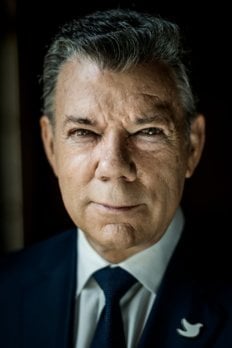
Pragmatist by nature, disciplined, cosmopolitan, committed to his country, Juan Manuel Santos has been an effective leader throughout his life. He was effective when it was time to wage war against illegal armed groups and he was even more effective in seeking and obtaining, against all odds, a peace agreement with Latin America’s oldest and largest insurgency, the FARC.
Santos belongs to one of Colombia’s most influential and traditional families. His great-great-grandfather’s siblings fiercely fought against Spanish troops in the early part of the 19th century and they were a determining factor in helping secure Colombian independence. His great-uncle, Eduardo Santos, was president of Colombia in the late 1930s. His grandfather was a renowned journalist, as were his father and his uncle, who for decades ran Colombia’s main newspaper El Tiempo, which belonged to their family.
He could probably have found his destiny in journalism, for obvious reasons, or perhaps in economics, which he studied at the University of Kansas and later at the London School of Economics and Harvard University. But Santos had a calling in his heart since a very early age, a bigger ambition: to make a mark in his country, to make a real difference and be able to transform realities. Perhaps for this reason he joined the Navy as a cadet at Colombia’s Naval Academy. Later on, after a decade of working as Colombian representative before the International Coffee Organisation in London, and after having completed a Nieman Fellowship at Harvard, and having worked as a columnist and deputy publisher at El Tiempo, where he won the prestigious King of Spain Award for Journalism, he decided to step aside and start his life in politics at the age of 40.
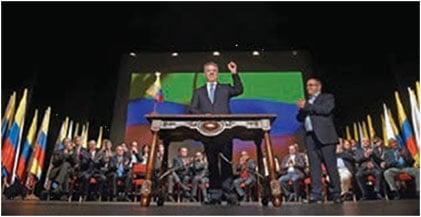
In the early 1990s, he was Colombia’s first minister of trade. He opened the economy and negotiated ambitious trade deals with several countries in Latin America and also began building ties to Asia. He was the last “designee” to the presidency, an office that was later replaced with the vice-presidency in Colombia’s constitution. He founded the Good Government Foundation which supported best practices in public governance and promoted the application of the Third Way, a political philosophy he learned from British sociologist Anthony Giddens and which states that “the market should go as far as possible, and the State as far as necessary.” This means achieving a balance between a liberal economy and government interventions to guarantee fundamental social issues such as equality, security and justice.
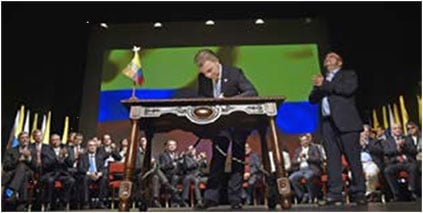
He was finance minister in the early 2000s and faced one of the country’s worst economic crises in the previous 70 years. While minister of defence between 2006 and 2009, he delivered the most severe blows in the history to the guerrillas, but always having peace as his ultimate objective. He achieved this through audacious strategic and tactical changes he made in the Armed Forces, and always guided by the respect of International Humanitarian Law.
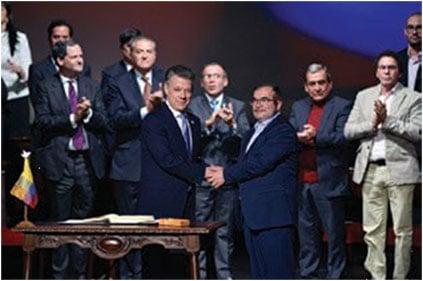
Santos assumed the presidency in 2010, and then was re-elected in 2014. From the beginning, he surprised most Colombians who had known him as a security hawk. In his inaugural address, he said one of his top priorities would be to seek peace through dialogue as long as he found a willing counterpart at the table. He did so and for six years he led tough, complex negotiations with the FARC that required chess skills and steely determination. The process, which was held in Havana, Cuba was finally completed successfully in late 2016, effectively putting and end to a 52-year internal armed conflict in Colombia.
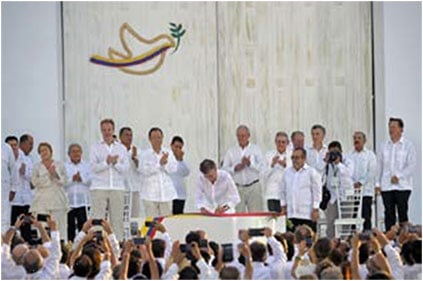
Juan Manuel Santos, who is considered a statesman internationally, has summed up his recent experience with a short yet powerful phrase: “It is far more difficult to make peace than it is to wage war, I know it because I have done both.” Fortunately for Colombia and for the world, he prevailed. He achieved what many Colombians had yearned for decades: persuade the guerrillas to trade their weapons for ballots, and violence for democracy, so that Colombia can advance without the burden of war toward the realisation of its maximum potential.
* This text is a slightly edited excerpt from Being Nobel – Nobel Peace Laureates and the Courageous Pursuit of Peace by Livia Malcangio, released by Editorial Planeta, Bogotá, in February 2017.
This autobiography/biography was written at the time of the award and later published in the book series Les Prix Nobel/ Nobel Lectures/The Nobel Prizes. The information is sometimes updated with an addendum submitted by the Laureate.
Nobel Prizes and laureates
Six prizes were awarded for achievements that have conferred the greatest benefit to humankind. The 14 laureates' work and discoveries range from quantum tunnelling to promoting democratic rights.
See them all presented here.
